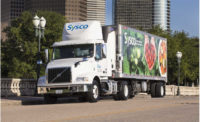US Foods Reports Q4 and Full Earnings for Fiscal Year 2020
Foodservice shutdowns due to the pandemic led to an 11.8% decrease in net sales and an 18.9% decrease in gross profit for 2020.

US Foods announced results for the fourth quarter and full fiscal year 2020. The fourth quarter of fiscal year 2020 included 14 weeks compared to 13 weeks for the fourth quarter of fiscal year 2019, and the full fiscal year 2020 included 53 weeks compared to 52 weeks in the full fiscal year 2019. Certain financial results here have been presented excluding the "extra week" in the fourth quarter and fiscal year 2020 in an effort to provide comparable results on a year-over-year basis.
Organic financial results exclude contributions from Smart Foodservice, which was acquired on April 24, 2020. For the Food Group, which was acquired on Sept. 13, 2019, organic financial results include contributions for the Sept. 14, 2020, through Jan. 2, 2021, time period only.
Fourth Quarter Fiscal 2020 Highlights:
- Total case volume decreased 10.2%; independent restaurant case volume decreased 6.0%. Excluding the extra week, total case volume decreased 15.5% and independent restaurant case volume decreased 11.8%.
- Total organic case volume decreased 15.4%; independent restaurant organic case volume decreased 13.1%. Excluding the extra week, total organic case volume decreased 20.4% and organic independent restaurant case volume decreased 18.5%.
- Net sales decreased 11.5% to $6.1 billion.
- Gross profit decreased 18.5% to $1.0 billion.
- Net loss available to common shareholders was $23 million.
- Adjusted EBITDA decreased 48.1% to $174 million. The extra week contributed approximately $8 million to Adjusted EBITDA.
- Diluted EPS loss was $0.11; Adjusted Diluted EPS was $0.05.
Fiscal Year 2020 Highlights:
- Total case volume decreased 11.0%; independent restaurant case volume decreased 11.2%. Excluding the extra week, total case volume decreased 12.5% and independent restaurant case volume decreased 12.7%.
- Total organic case volume decreased 21.3%; independent restaurant organic case volume decreased 20.8%. Excluding the extra week, total organic case volume decreased 22.6% and organic independent restaurant case volume decreased 22.2%.
- Net sales decreased 11.8% to $22.9 billion.
- Gross profit decreased 18.9% to $3.7 billion.
- Net loss available to common shareholders was $254 million.
- Adjusted EBITDA decreased 45.7% to $648 million.
- Diluted EPS loss was $1.15; Adjusted Diluted EPS was $0.09.
CEO Perspective
“Our industry, our customers and our company faced many challenges in 2020 from the spread of COVID-19,” said Chairman and CEO Pietro Satriano. “We took quick and decisive action in the first half of 2020 to ensure the safety of our associates, support our customers, strengthen liquidity and reduce our operating costs. Net sales and Adjusted EBITDA improved in the second half of 2020; a result of industry rebounds, market share gains and a continued focus on operational efficiencies. While the timing of the recovery remains uncertain, we remain confident in the resiliency of the industry and believe that the actions we have taken in 2020 have positioned the company well for future growth."
Fourth Quarter Fiscal 2020 Results
Total case volume decreased 10.2% from the prior year, while total organic case volume decreased 15.4%. Independent restaurant case volume decreased 6.0% from the prior year, while organic independent restaurant case volume decreased 13.1%. Net sales of $6.1 billion for the quarter decreased 11.5% from the prior year. Increases in the number of COVID-19 cases and the implementation of additional restrictions on in-person dining in many markets resulted in a slowdown in total case volume during the last six weeks of the quarter. Smart Foodservice contributed $275 million to Net sales in the fourth quarter.
Gross profit of $1.0 billion decreased $229 million, or 18.5%, from the prior year, primarily as a result of the negative impact of COVID-19 on case volume, changes to our customer mix, higher logistics costs and an unfavorable year-over-year LIFO adjustment. These factors were partially offset by contributions from Smart Foodservice, which was not owned by the company in the prior year period. Gross profit as a percentage of Net sales was 16.4%. Adjusted Gross profit was $1.0 billion, a 17.0% decrease from the prior year, driven by the negative impact of COVID-19 on case volume, changes to our customer mix and higher logistics costs. These factors were partially offset by contributions from Smart Foodservice. Adjusted Gross profit as a percentage of Net sales was 16.8%.
Operating expenses of $978 million decreased $73 million, or 6.9% from the prior year. The decrease was primarily due to actions put into place to reduce operating costs as a result of lower case volume and an $18 million reduction in the reserve for uncollectible accounts, which were partially offset by operating expenses for Smart Foodservice. Operating expenses as a percent of Net sales were 15.9%. Adjusted Operating expenses for the quarter were $865 million, a decrease of $48 million, or 5.3% from the prior year, primarily due to actions put in place to reduce operating costs as a result of lower case volume, which were partially offset by operating expenses for Smart Foodservice. Adjusted Operating expenses as a percent of Net sales were 14.1%.
Net loss available to common shareholders was $23 million, a decrease of $115 million compared to the prior year. Adjusted EBITDA was $174 million, a decrease of $161 million, or 48.1%, compared to the prior year. Diluted EPS loss was $0.11; Adjusted Diluted EPS was $0.05.
Fiscal Year 2020 Results
Total case volume decreased 11.0% from the prior year, while total organic case volume decreased 21.3%. Independent restaurant case volume decreased 11.2%, while organic independent restaurant case volume decreased 20.8%. Net sales of $22.9 billion decreased 11.8% from the prior year. Total case volume and Net sales results for fiscal year 2020 were negatively impacted by the COVID-19 pandemic and measures implemented to mitigate its spread. The Food Group and Smart Foodservice acquisitions contributed an aggregate of $3.1 billion to Net sales in fiscal year 2020.
Gross profit of $3.7 billion decreased $868 million, or 18.9%, from the prior year, primarily as a result of the negative impact of COVID-19 on case volume, changes to our customer mix, higher logistics costs and an unfavorable year-over-year LIFO adjustment. These factors were partially offset by contributions from Food Group and Smart Foodservice. Gross profit as a percentage of Net sales was 16.3%. Adjusted Gross profit was $3.8 billion, a 17.7% decrease from the prior year, driven by the negative impact of COVID-19 on case volume, changes to our customer mix and higher logistics costs. Adjusted Gross profit as a percentage of Net sales was 16.6%.
Operating expenses of $3.8 billion decreased $92 million, or 2.4% from the prior year. The decrease was primarily due to actions put in place to reduce operating costs as a result of lower case volume, which were partially offset by a $47 million net increase in the reserve for uncollectible accounts due to COVID-19 and operating expenses for the Food Group and Smart Foodservice acquisitions. Operating expenses as a percent of Net sales were 16.6%. Adjusted Operating expenses were $3.2 billion, a decrease of $256 million, or 7.5% from the prior year, primarily due to actions put in place to reduce operating costs as a result of lower case volume, which were partially offset by operating expenses for the Food Group and Smart Foodservice acquisitions. Adjusted Operating expenses as a percent of Net sales were 13.8%.
Net loss available to common shareholders was $254 million, a decrease of $639 million compared to the prior year. Adjusted EBITDA was $648 million, a decrease of $546 million, or 45.7% compared to the prior year. Diluted EPS loss was $1.15; Adjusted Diluted EPS was $0.09.
Cash Flow and Capital Transactions
Net cash provided by operating activities for fiscal 2020 was $413 million, a decrease of $347 million from the prior year primarily driven by lower case volume due to COVID-19, which was partially offset by the company's reduced working capital requirements. Cash capital expenditures for fiscal 2020 totaled $189 million, compared to $258 million in the prior year, as the company pared back on capital projects due to COVID-19.
Total Debt at the end of fiscal year 2020 was $5.7 billion, an increase of $1.0 billion versus the end of fiscal 2019. The increase was a result of additional indebtedness incurred to finance the Smart Foodservice acquisition and to strengthen the company's liquidity position in connection with the rapid onset of COVID-19. Net Debt at the end of fiscal year 2020 was $4.9 billion, an increase of $282 million versus the end of fiscal 2019. The ratio of Net Debt to Adjusted EBITDA was 7.6x at the end of fiscal 2021, up from 3.9x at the end of fiscal 2019 primarily as a result of lower Adjusted EBITDA as discussed above.
Outlook for Fiscal Year 2021
Due to the continued uncertainty associated with COVID-19 and the timing of a recovery, the company is not providing financial guidance for fiscal 2021.
About US Foods
US Foods is one of America’s great food companies and a leading foodservice distributor, partnering with approximately 300,000 restaurants and foodservice operators to help their businesses succeed. With 70 broadline locations and 78 cash and carry stores, US Foods provides its customers with a broad and innovative food offering and a comprehensive suite of e-commerce, technology and business solutions. US Foods is headquartered in Rosemont, Illinois.
Looking for a reprint of this article?
From high-res PDFs to custom plaques, order your copy today!





